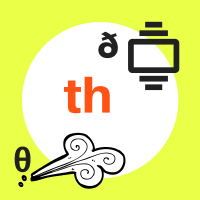
What is the difference in pronunciation between the 2 ‘th’ sounds at the end of words?
What is the difference in pronunciation between the ‘th’ sounds, theta and ð, at the end of words? Answered by Peggy Tharpe They are the same sound basically. The only difference is the airiness or soft hissing that comes with Read More …
